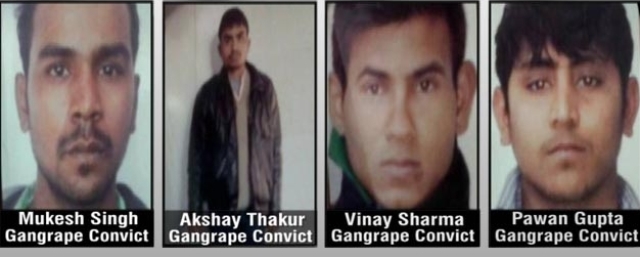An Indian court has sentenced four men to death for the gang rape and murder of a student in the capital Delhi.
Mukesh Singh, Vinay Sharma, Akshay Thakur and Pawan Gupta were found guilty on all counts earlier this week.
Judge Yogesh Khanna said the case fell in the “rarest of rare category”, rejecting pleas for lighter sentence.
The woman, 23, was attacked on a bus in December and died two weeks later. The case led to days of violent protest across India and new laws against rape.
On Friday, Judge Khanna said the attack “shocked the collective conscience” of India, and that “courts cannot turn a blind eye” to such crimes.
“This case definitely falls in the rarest of rare categories and warrants the exemplary punishment of death,” he added.
One of the convicted men, Vinay Sharma, broke down in tears as the sentence was announced.
Earlier, protesters outside the court had demanded that the four men must be hanged.
A shocking attack
The brutality of the New Delhi attack, as described by police and prosecutors, helped stir the strong emotions surrounding the case.
On the evening of December 16, the victim, a 23-year-old physiotherapy student, had gone to see the movie “The Life of Pi” with a male friend at a New Delhi mall.
During their journey home to the suburbs, they boarded a bus at a major intersection in upmarket South Delhi.
The driver and at least five other men on the bus were drunk and looking for a “joyride,” police said.
The men, from a poverty-ridden slum on the outskirts of Delhi, dragged the woman to the back of the bus and beat up her male friend.
Police say the men took turns raping the woman, using an iron rod to violate her as the bus drove around the city for almost an hour. When they had finished, they dumped the two victims by the side of the road.
The woman’s injuries were so severe that some internal organs had to be removed. She died two weeks later at a hospital in Singapore.
Found guilty
After a trial that lasted about seven months, the Delhi court on Tuesday convicted four of the men — aged between 19 and 28 — of murder, rape and kidnapping.
The victim’s parents had tears in their eyes as the judge read out the verdict, in which he said the men had been found guilty of “committing the murder of a helpless victim.” Her brother wiped a tear from his cheek.
The victim’s name has been withheld under Indian law.
The four men — Vinay Sharma, Akshay Thakur, Pawan Gupta and Mukesh Singh — will appeal the verdict, their lawyers said.
Opinion: Victims blamed in India’s rape culture
The question Friday is whether they will receive the death penalty.
Death sentences issued by Indian courts have rarely been carried out in the past decade. No state executions took place in the country between 2004 and late 2012, when the last surviving gunman from the 2008 terrorist attacks in Mumbai was hanged.
But human rights advocates have said they fear that India’s stance on executions has changed.
“In the past year, India has made a full-scale retreat from its previous principled rejection of the death penalty,” Meenakshi Ganguly, South Asia director at Human Rights Watch, said last month.
Two others accused
The fate of two others accused in the case had already been determined before this week.
One man, Ram Singh, 35, was found dead in his jail cell in March. Authorities said he had hanged himself, but his family claimed he had been murdered.
A juvenile court convicted a teenage boy on August 31 for his part in the gang rape, sentencing him to three years in a special juvenile correctional facility.
His trial was in juvenile court because he was 17 at the time of the crime, and the sentence is the maximum allowed under the court’s rules.
Many Indians, including the victim’s family, expressed dissatisfaction with the sentence.
A rape every 22 minutes
As in many countries, rape is a grimly frequent occurrence in India.
According to Indian government statistics, a woman is raped every 22 minutes on average.
But the New Delhi attack seized the country’s attention.
Advocates criticized the world’s largest democracy for failing to protect half of its population. Protesters demanded better treatment of women and decried the apathy of police and the judicial system.
The government passed tougher anti-rape laws, introducing the death penalty for repeat offenders, and imprisonment for acid attacks, human trafficking and stalking.
But some Indians say that while the laws on crimes against women have changed, mindsets and enforcement have been slower to adjust.
‘Take it to the source’
Government figures show that the number of women reporting rapes has risen significantly since the New Delhi attack and the heavy scrutiny that followed it.
Observers say it indicates that women who are victims of sexual attacks feel more emboldened to come forward than they did before.
Meet India’s Red Brigade: Teens fighting back against rape
Prosecution of such crimes has improved, said Kiran Bedi, a human rights activist and former Indian police officer But it will take a heavy emphasis on the family and school environments to resolve the problem in the long run, Bedi believes.
“You can’t just begin and end with the police and the prosecution and the courts,” she said. “You have to go backward and take it to the source.”
India grapples with rape and sexual violence



